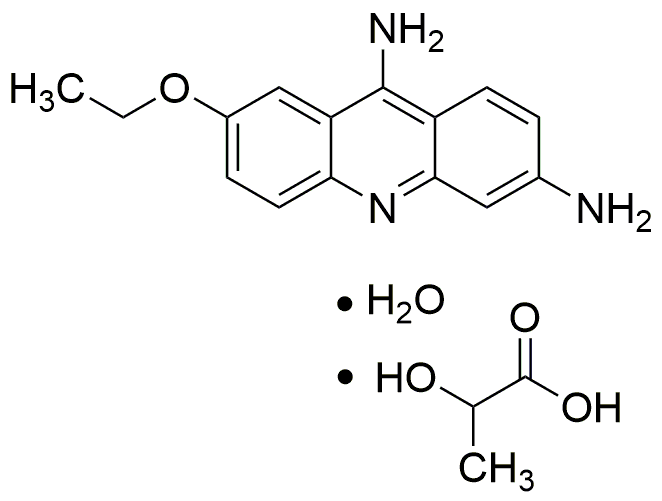Acrinol monohydrate is widely utilized in research focused on:
- Antimicrobial Applications: This compound is effective against various bacteria and fungi, making it valuable in developing antiseptics and disinfectants for healthcare settings.
- Pharmaceutical Formulations: Its properties allow for incorporation into drug formulations, enhancing the solubility and bioavailability of active pharmaceutical ingredients.
- Biological Research: Acrinol monohydrate serves as a fluorescent probe in cellular studies, aiding researchers in visualizing cellular processes and interactions.
- Textile Industry: It is used in dyeing processes due to its ability to bind with fibers, providing vibrant colors and improving fabric durability.
- Environmental Applications: The compound is explored for its potential in wastewater treatment, where it helps in the removal of pollutants and enhances water quality.
Informations générales
Propriétés
Sécurité et réglementation
Applications
Acrinol monohydrate is widely utilized in research focused on:
- Antimicrobial Applications: This compound is effective against various bacteria and fungi, making it valuable in developing antiseptics and disinfectants for healthcare settings.
- Pharmaceutical Formulations: Its properties allow for incorporation into drug formulations, enhancing the solubility and bioavailability of active pharmaceutical ingredients.
- Biological Research: Acrinol monohydrate serves as a fluorescent probe in cellular studies, aiding researchers in visualizing cellular processes and interactions.
- Textile Industry: It is used in dyeing processes due to its ability to bind with fibers, providing vibrant colors and improving fabric durability.
- Environmental Applications: The compound is explored for its potential in wastewater treatment, where it helps in the removal of pollutants and enhances water quality.
Documents
Fiches de données de sécurité (FDS)
La FDS fournit des informations de sécurité complètes sur la manipulation, le stockage et l’élimination du produit.
Spécifications du produit (PS)
Le PS fournit une description complète des propriétés du produit, notamment sa composition chimique, son état physique, sa pureté et les exigences de stockage. Il détaille également les plages de qualité acceptables et les applications prévues du produit.
Certificats d'analyse (COA)
Recherchez des certificats d'analyse (COA) en saisissant le numéro de lot du produit. Les numéros de lot et de lot se trouvent sur l'étiquette d'un produit, après les mots « Lot » ou « Lot de fabrication ».
Numéro de catalogue
Numéro de lot/série
Certificats d'origine (COO)
Ce certificat d'exploitation confirme le pays dans lequel le produit a été fabriqué, et détaille également les matériaux et composants utilisés et s'il est issu de sources naturelles, synthétiques ou autres sources spécifiques. Ce certificat peut être requis pour les douanes, le commerce et la conformité réglementaire.
Numéro de catalogue
Numéro de lot/série
Fiches de données de sécurité (FDS)
La FDS fournit des informations de sécurité complètes sur la manipulation, le stockage et l’élimination du produit.
DownloadSpécifications du produit (PS)
Le PS fournit une description complète des propriétés du produit, notamment sa composition chimique, son état physique, sa pureté et les exigences de stockage. Il détaille également les plages de qualité acceptables et les applications prévues du produit.
DownloadCertificats d'analyse (COA)
Recherchez des certificats d'analyse (COA) en saisissant le numéro de lot du produit. Les numéros de lot et de lot se trouvent sur l'étiquette d'un produit, après les mots « Lot » ou « Lot de fabrication ».
Numéro de catalogue
Numéro de lot/série
Certificats d'origine (COO)
Ce certificat d'exploitation confirme le pays dans lequel le produit a été fabriqué, et détaille également les matériaux et composants utilisés et s'il est issu de sources naturelles, synthétiques ou autres sources spécifiques. Ce certificat peut être requis pour les douanes, le commerce et la conformité réglementaire.


